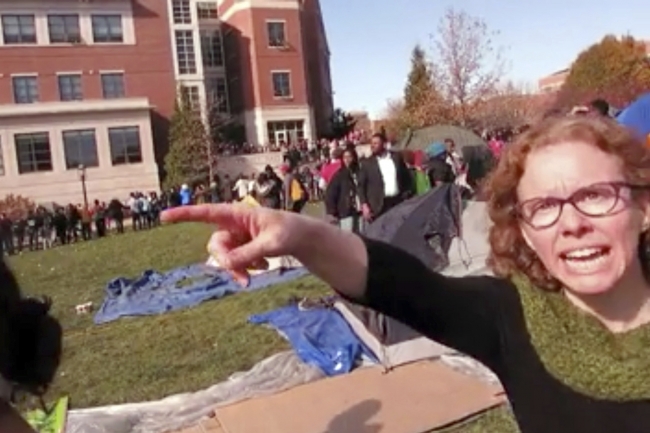The fallout from the protests on the racial environment at the University of Missouri continues. The university has fired Melissa Click, an assistant professor in communications. Click was videoed calling for “muscle” to help remove a student reporter and became a lightning rod for critics of the protesters. After voting to fire her, the board acknowledged the process used to terminate Click was not typical. This seems to be the only point where everyone agrees. Today, I want to tackle the question of whether they were right to fire her.

To begin, I find Professor Click’s behavior disappointing and reprehensible. I don’t know her, but I have colleagues that I can see being a part of the protest and even responding in similar ways.
I don’t consider that part of my role as a faculty member. It doesn’t mean that I’m right and she’s wrong— necessarily. We just view our roles differently.
Yet, I do take issue with her calling for removing the student journalist. I understand why it happened. Emotions were running high. Everyone was tired and stressed.
Moreover, the issues raised by the protesters are important and need to be addressed. This should not be forgotten.
After reviewing the video, Click issued a statement of apology as well as apologizing directly to the student reporter involved.
I take Click at her word that she was caught up in the moment and she regrets her behavior.
Apologizing and remorse are important, but insufficient to fully resolve the issues with Professor Click’s behavior.
According to the university’s policies (approved by the board), there is a procedure in place to evaluate a professor’s behavior and make a determination regarding employment.
To instigate the proceedings, a faculty member must file a compliant which then gets investigated and adjudicated.
No faculty member filed a complaint against Click. According to news reports, a few considered doing so but ultimately decided that Click’s apology and the turmoil she faced in the months after the incident were sufficient resolutions.
In the absence of a formal complaint, there was no policy mechanism for a faculty committee to investigate and decide Click’s fate.
With the faculty’s inaction, the board decided to investigate and ultimately terminate her.
Shared governance proponents and faculty leaders have condemned the board’s actions.
Quite honestly, I typically would have agreed that the board overreached, but I find myself not feeling that way. At least not entirely.
For a number of reasons, I wish the board would have charged the faculty with looking into the case. In effect, let the board serve as complainant.
This would be atypical, but more consistent with the letter and spirit of the university’s policies.
I don’t know how I would have voted if I was on a faculty committee or on the board. I think there are strong arguments both for and against firing her.
However, given the uproar on campus the past few months, I believe the board should have taken the time to use campus procedures.
Not only would this give Click due process, but show that the university is committed to principles of share governance.
Some faculty would argue that it isn’t the board’s role the file a complaint or inject itself into disciplinary process. Ordinarily I would agree, but I do find the board’s argument that this is an unusual situation compelling.
In the end, I believe the board was wrong to make this decision on their own. They should have used a faculty-driven process to determine what to do (if anything) with Click.
Many of these cases are pretty open and shut, but this one is more complicated than I think many advocates on both sides are willing to admit.

